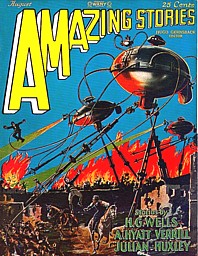War of the species

Frank R. Paul's 1927 illustration
Steven Spielberg's War of the Worlds is the usual technically proficient Hollywood schlock. Undoubtedly, a British director, working with British actors, would have made a more interesting film. Still, apart from the failed-father-redeems-himself hook, and being set in the wrong country and century, the movie is reasonably faithful in many of its details to H. G. Wells' 1898 novel. The novel itself is primarily an account of the havoc wreaked by invaders from Mars, with only a very little reflection on the metaphorical meaning of it all. Clearly, though, Wells enjoyed taking a poke at the smug satisfaction of imperial Britain, as his alien invaders trample London like someone kicking apart an anthill (his own image). In the movie, Spielberg visually references the aftermath of the 9/11 attack on New York, but it seems a stretch to see the story as about terrorism, Iraq, eco-catastrophe, or anything other than the frisson of the modern end-of-the-world genre. And yet,
...across the gulf of space, minds that are to our minds as ours are to those of the beasts that perish, intellects vast and cool and unsympathetic, regarded this earth with envious eyes, and slowly and surely drew their plans against us.Wells' allusion to imperialism is clear, but is The War of the Worlds then also about animal rights? (I am indebted to Shannon Elliott for pointing this out.) The Martians do not eat, as such, but nourish themselves by directly injecting the blood of other creatures into their own veins. It seems they mean to turn humans into domesticated farm animals for this purpose. Wells' story implicitly raises the question that is raised explicitly by philosopher Mark Rowlands, author of Animals Like Us and Animal Rights: A Philosophical Defence. That is, what argument could we make against being used as a food source by powerful alien conquerors of Earth? The sorts of argument typically used to justify human exploitation of non-humans--namely, that we're smarter than they are, or that it's natural for predators to consume prey--suddenly may not seem quite as attractive or convincing when we're on the losing end of things.
And we men, the creatures who inhabit this earth, must be to them at least as alien and lowly as are the monkeys and lemurs to us. ... Their world is far gone in its cooling, and this world is still crowded with life, but crowded only with what they regard as inferior animals. ... And before we judge of them too harshly, we must remember what ruthless and utter destruction our own species has wrought, not only upon animals, such as the vanished bison and the dodo, but upon its own inferior races. The Tasmanians, in spite of their human likeness, were entirely swept out of existence in a war of extermination waged by European immigrants in the space of fifty years. Are we such apostles of mercy as to complain if the Martians warred in the same spirit?




<< Home